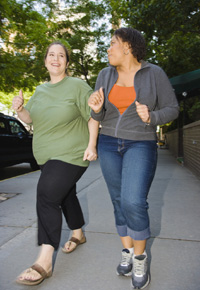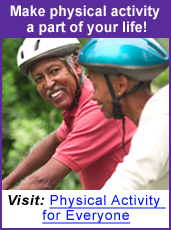Getting Started with Physical Activity for a Healthy Weight
Should I take any precautions before becoming more active?
People with chronic diseases, such as a heart condition, arthritis, diabetes, or high blood pressure, should talk to their doctor about what types and amounts of physical activity are appropriate.
Get Motivated!
If you've not been physically active in a while, you may be wondering how
to get started again. Lace up those sneakers and find some motivating ideas
here.
Here are some tips to help get you started:
-
 Look
for opportunities to reduce sedentary time and to increase active time. For
example, instead of watching TV, try taking a walk after dinner.
Look
for opportunities to reduce sedentary time and to increase active time. For
example, instead of watching TV, try taking a walk after dinner. - Set aside specific times for physical activity in your schedule to make it part of your daily or weekly routine.
- Start with activities, locations, and times you enjoy. For example, some people might like walking in their neighborhood in the mornings; others might prefer an exercise class at a health club after work.
- Try activities with friends or family members to help with motivation and mutual encouragement.
- Start slowly and work your way up to more physically challenging activities. For many people, walking is a particularly good place to begin.
- When necessary, break up your daily activity goal into smaller amounts of time. For example, you could break the 30-minute a day recommendation into three 10-minute sessions or two 15-minute sessions. Just make sure the shorter sessions are at least 10 minutes long.
For many people, walking offers a great way to become more active. For some ideas on how to begin, see the walking plans at the following sites:
- Weight-control Information Network: Walking — A Step in the Right Direction
- American Heart Association: Start! Walking*
For more information about physical activity if you're overweight or obese, suggestions for initial activities, and safety tips, see Active at Any Size.
Strategies for Overcoming Obstacles to Physical Activity
If you're just getting started, you might face certain obstacles that seem difficult to overcome. A few examples of common obstacles and strategies for overcoming them are shown in the following table.
| Obstacle | Try This |
|---|---|
| I just don't have time to be physically active. | Identify available time slots. Monitor your daily activities for one week. Identify at least three 30-minute time slots you could use for physical activity. |
| I don't have anyone to go with me. | Develop new friendships with physically active people. Join a group, such as the YMCA or a hiking club. |
| I'm so tired when I get home from work. | Schedule physical activity for times in the day or week when you feel energetic. |
| I have so much on my "to do" list already, how can I do physical activity too? | Plan ahead. Make physical activity a regular part of your daily or weekly schedule by writing it on your calendar. Keep the appointment with yourself. |
| I'll probably hurt myself if I try to be more physically active. | Consult with a health professional or educational material to learn how to exercise appropriately considering your age, fitness level, skill level, and health status. |
| I'm not coordinated enough to be physically active. I can't learn something new at my age! | Select activities requiring no new skills, such as walking, climbing stairs, or jogging. |
| My job requires me to be on the road, it's impossible for me to exercise. | Stay in places with swimming pools or exercise facilities. Or find a DVD exercise tape that you enjoy and request a DVD player with your room. |
| I have small children and it's impossible to have time to myself for exercise. | Trade babysitting time with a friend, neighbor, or family member who also has small children. As children get older, family bike rides or walks might be another option. |
| Adapted from Physical Activity for Everyone: Making Physical Activity Part of Your Life: Overcoming Barriers to Physical Activity. | |
Want to learn more?
Physical Activity for a Healthy Weight
You are probably already aware that regular physical activity is
important for good health, but did you know that it's especially important
if you're trying to lose weight or to maintain a healthy weight?
For general Physical Activity information, see Physical Activity for Everyone.
![]() Please note: Some of these publications are available for download only as *.pdf files. These files require Adobe Acrobat Reader in order to be viewed. Please review the information on downloading and using Acrobat Reader software.
Please note: Some of these publications are available for download only as *.pdf files. These files require Adobe Acrobat Reader in order to be viewed. Please review the information on downloading and using Acrobat Reader software.
* Links to non-Federal organizations found at this site are provided solely as a service to our users. These links do not constitute an endorsement of these organizations or their programs by CDC or the Federal Government, and none should be inferred. CDC is not responsible for the content of the individual organization Web pages found at these links.
Page last updated: November 21, 2008
Content Source: Division of Nutrition, Physical Activity and Obesity, National Center for Chronic Disease Prevention and Health Promotion


